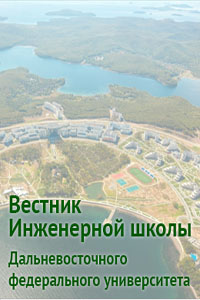Prospects for the development of ship repair in the Far East
DOI:
https://doi.org/10.24866/2227-6858/2025-1/89-104Keywords:
shipbuilding, ship repair, repair technologies, condition-based maintenance, digitalization, personnel trainingAbstract
The tasks for the development of shipbuilding and ship repair in Russia and in particular in Far East Russia, as set out by the Strategy for the Development of the Shipbuilding Industry for the Period up to 2035 (hereinafter referred to as the Strategy), since its adoption have intrinsically been supplemented by the strategic task of their implementation on the basis of technological sovereignty. The development of the ship repair sector of shipbuilding industry is related to the fleet composition and quality, and has some certain regional features. Thus, the fleet to be operated in the Far Eastern basin and in the East Arctic sector is being replenished with ships of increased ice-breaking capability and multifunctionality, equipped with environment-friendly power plants, new propulsive systems, and cryogenic machinery. Consequently, new domestic fleet requires the kind of ship repairs that in addition to traditional repair process operations would provide its innovation components’ repair technology operations. Based on global technological development trends in the field of shipbuilding, that are inherent to the new regional fleet as well, repair process operations to be absorbed by the regional ship repair sector have been analyzed in order to provide on a competitive basis the repair technology operations to the newly-built ships that would gradually substitute the ships currently in operation. The study of technological innovations in shipbuilding has dictated the need for new organizational forms of ship repair, including the transfer of all stages of the life cycle of the fleet, starting with its design, construction and further maintenance on the vessel, at the ship repair enterprise, to a single information platform, which will eventually make it possible to transfer the fleet to the most effective system of actual condition-based maintenance. The most important aspect of such a transformation of regional ship repair is the process of advanced provision of the ship repair sector with personnel capable of solving tasks at a qualitatively new level, therefore, it is a strategic need of the day to rebuild the system of training specialists for ship repair facilities, modernizing it with the participation of industrial partners, updating its material and methodological base.
References
1. Стратегия развития судостроительной промышленности на период до 2035 года / Распоряжение Правительства Российской Федерации от 28 октября 2019 г. № 2553-р.
2. Ogai S.A., Voyloshnikov M.V. Systemic approach of design characteristics determining of multifunctional ships for frozen seas. Vladivostok: Maritime State University named after admiral G.I. Nevelskoy, 2021. 448 p.
3. Афанасьева С.Ю. Устройство Walk to Work для пересадки людей в море // Научно-технический сборник Российского морского регистра судоходства. 2024. № 76. С. 137–147.
4. Флот // Морская спасательная служба. URL: https://morspas.ru/flot_series/ (дата обращения: 04.02.2025).
5. Грузоперевозки морским транспортом (рынок России). Опубл. 16.01.2025 // Tegviser. Государство. Бизнес Технологии. URL: https://www.tadviser.ru/ (дата обращения: 03.02.2025).
6. В РФ за 10 лет в обновление флота инвестировали не менее 350 млрд руб. Опубл. 11.09.2024 // Specagro. Центр Агроаналитики. URL: https://specagro.ru/ (дата обращения: 04.02.2025)
7. Данилов Н.В., Соминская Э.В., Трусов В.И. Ледостойкие системы противокоррозионной защиты // Морские интеллектуальные технологии. 2019. Т. 1, № 2 (44). С. 111–114.
8. Крыжевич Г.Б. Совершенствование конструкций судов для транспортировки сжиженного природного газа // Морские интеллектуальные технологии. 2020. Том 1, № 3. С. 84–89.
9. Международная конвенция о контроле судовых балластных вод и осадков и управлении ими 2004 года // Электронный фонд правовых и нормативно-технических документов. URL: https://docs.cntd.ru/document/902152089 (дата обращения: 04.02.2025).
10. Астафурова И.С. Кластер судостроения и судоремонта Приморского края: перспективы и возможности // Территория новых возможностей. Вестник Владивостокского государственного университета экономики и сервиса. 2018. Т. 10, № 2. С. 28–36.
11. Рогов А.З., Огай С.А. Состояние и перспективы развития судоремонта на Дальнем Востоке // Проблемы транспорта Дальнего Востока: Доклады научно-технической конференции. 2019. Т. 1. С. 369–372.
12. Drop Stitch – технология пошива надувных изделий, обеспечивающая высокую прочность и надёжность // SPORTZONE. URL: https://sportzone.ua/info-sup-bording/detail/drop-stitch-tehno-logiya-poshiva-naduvnyh-izdeliy-o/ (дата обращения: 03.02.2023).
13. Иванов А.В., Ваганов В.В., Билецкий Н.А. Особенности организации судового ремонта с помощью аддитивных технологий // Морские интеллектуальные технологии. 2020. Т. 1, № 1. С. 118–124.
14. Развитие аддитивных технологий в судостроении и судоремонте. Опубл. 20.02.2024 // Аддитивные технологии. URL: https://additiv-tech.ru/ (дата обращения: 04.02.2025).
Downloads
Published
Issue
Section
License
Copyright (c) 2025 Far Eastern Federal University: School of Engineering Bulletin

This work is licensed under a Creative Commons Attribution 4.0 International License.

